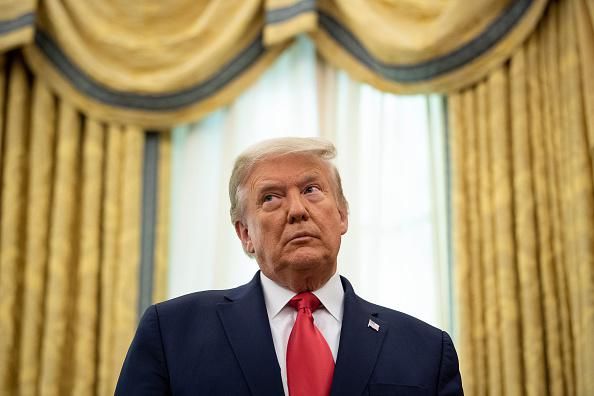I'm confused—does Trump really believe that he won a Nobel Peace Prize?
Updated: January 13, 2021 at 5:12 pm.
Donald Trump's Twitter left me with a lot of confusion, as per usual.
Despite everything being seemingly normal, you know, the usual recent bombardment of tweets such as being named Africa World Newspaper'sAfricaMan of the Year, calling news outlets boring and incoherent, the continuous allegations of voter fraud, etc.
However, on Monday, a recent video ( which has been withheld in response to a report from the copyright holder) seemed to be a campaign video for the election he lost almost two months ago. It chronicles all of his best moments as POTUS, including the executive orders he signed, the boat parade, and Supreme Court Justice appointments.
A particular section of the video that was very odd to me was when Trump alleged that he is for peace with the Nobel Peace Prize insignia superimposed over Trump at the Abraham Accords' ceremony at the White House.
The deal, which was historic for the normalization of the United Arab Emirates, Bahrain, and Israel when it comes to politics, this isn't a confirmation that Trump won the Nobel Peace Prize—unless he thinks it is?
Now we know that Trump perceiving things to be one way when they're not is on-brand for him, but this, to my surprise, has been something that has repeatedly appeared throughout his presidency. But similar to his suggestion that his face should be the needed addition to the Mt.Rushmore monument, it is merely a wishful delusion—delusions that only fit his version of reality and not the general consensus.
READ: What happens if Trump refuses to physically vacate the White House on Inauguration Day?
Considering the White House officially gave Joe Biden permission to begin the transition process, and the Electoral College finalized their decision, there's really only one thing that can happen.
Although it may be unlikely that Trump will win a Nobel Peace Prize in his lifetime, there's this alarmingly strange enamor with the humanitarian award and overall peace that led him to poke at the idea of deserving the accolade. I'm not exactly sure why that is.
In March of 2018, The Washington Post reported on The Norwegian Nobel Committee discovering that someone's identity was stolen, appearing to be a qualified nominator in order to nominate Trump for the Nobel Peace Prize, twice in a row. The White House followed this up, allegedly asking former prime minister Shinzo Abe to nominate Trump for the award in 2019.
Back in September of 2020, the White House released a statement announcing that Trump had been nominated for his involvement in the Abraham Accords, which was put forward by the far-right Norwegian lawmaker, Christian Tybring-Gjedde.
In addition, recent reports state that Prime Minister Boris Johnson is also standing firm in his word that Trump should receive a Nobel Peace Prize.
All in all, Trump's apparent need to celebrate his accomplishments regardless if they're real or fake makes it hard not to consider Trump's faux campaign videos will immediately cease when he leaves the White House. But there is a small victory in the fact that there will be no real obligation to pay attention to his antics or political dreams anymore.
Have you got something to say about this subject? Submit a post here and start the conversation.
- Trump's Nobel Nonsense - FactCheck.org ›
- Letter to the Editor, Oct. 8, 2020: Trump gets 3 nominations for 2021 ... ›
- Donald Trump Nominated For Nobel Peace Prize, Here's What That ... ›
- Trump's dream of a Nobel Peace Prize kept alive by far-flung foreign ... ›
- Donald Trump seems to think he has already won the Nobel Peace ... ›
